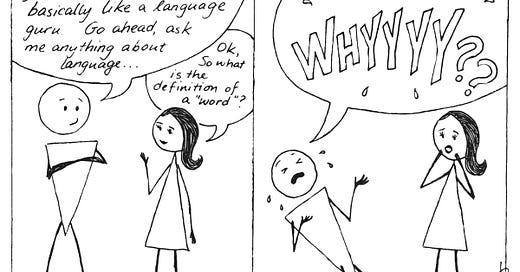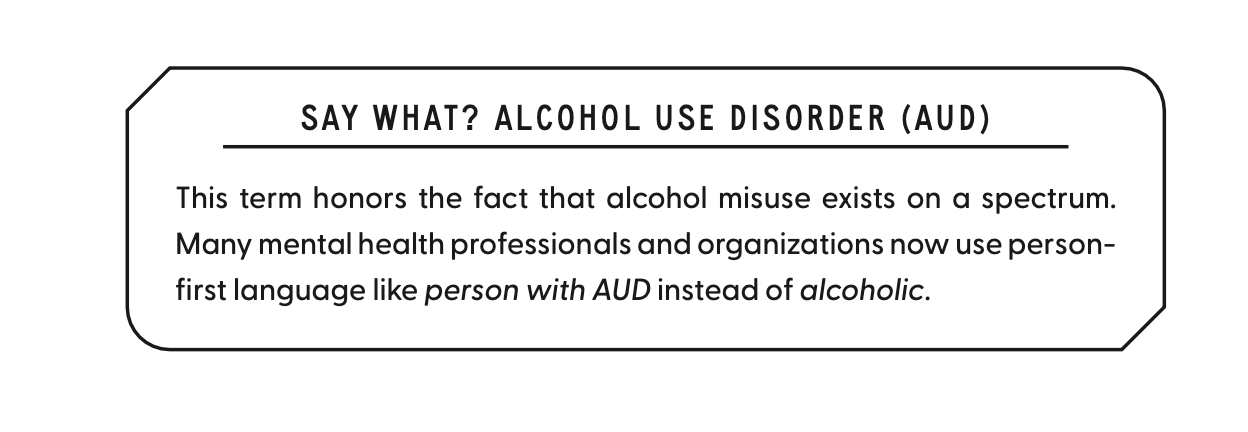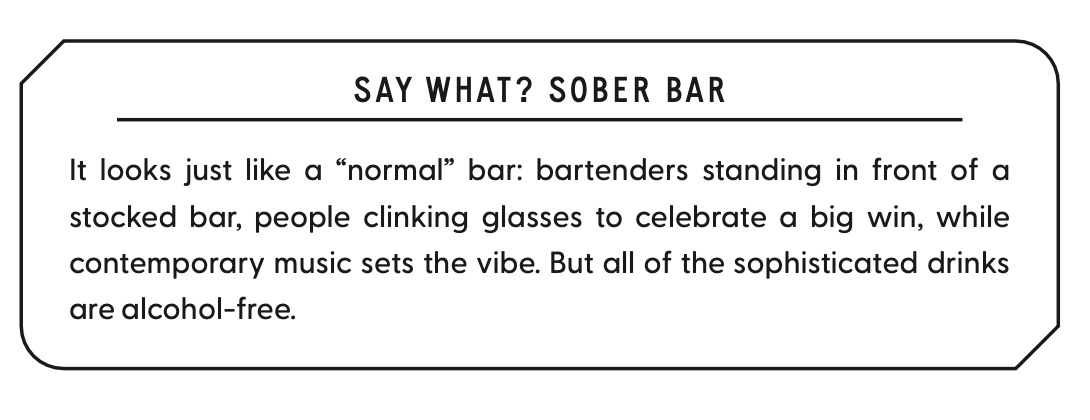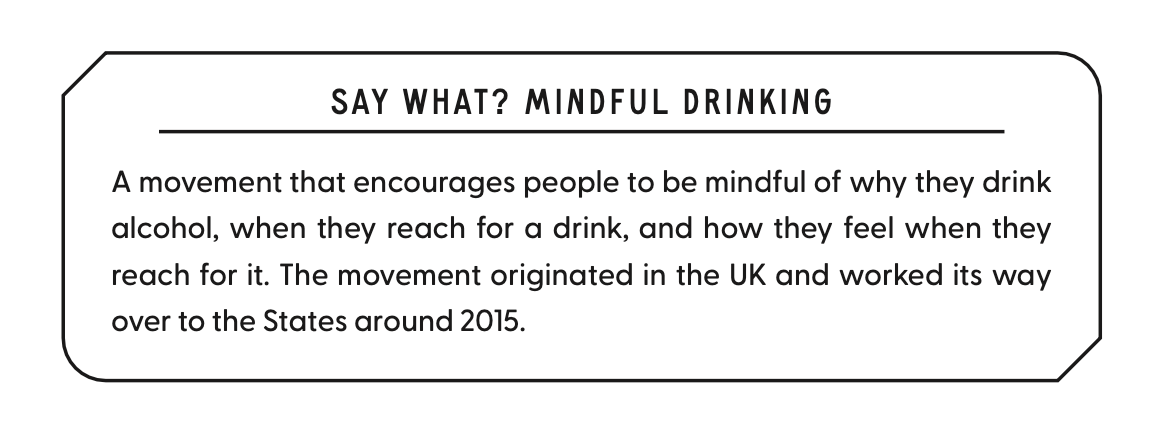The Sobriety Glossary You Never Knew You Needed
🤓Plus — a live event on the language of sobriety
I’m Tawny, author of Dry Humping: A Guide to Dating, Relating, and Hooking Up Without the Booze, co-host of the Recovery Rocks podcast, and co-founder of the vinegar-based botanical beverage, (parentheses)
(Update: Watch this live recording of me and having a frank discussion on the language of sobriety in an effort to prevent gatekeeping. We also discuss the importance of remaining open to new information and embracing nuance with critical thinking on your sober or sober curious journey. Whether you're in recovery, California sober, sober curious, a mindful drinker, or just want to listen to people talk about mental health and language, you can totally sit with us.)
If I went back to school today, I would study linguistics. I love words (duh) and learning where they came from, how they formed, and breaking them down into prefixes and suffixes.
I read modern linguistic books by
and. Learning how the English language works also helps me study other languages, mostly Spanish. I’m a proud word nerd. 🤓 I’ve reported on the sober and sober curious space for more than eight years. I’ve seen a lot of trends come and go, especially linguistic trends.Dry January now has its more approachable partner, Damp January. Done with drinking but still enjoying cannabis and psychedelics? Enter California Sober. Want to change your relationship with alcohol but still unsure if you’re done with drinking forever? Perhaps you’re Sober Curious or a Grey Area Drinker.
While writing my book, I also wrote a companion glossary to exist in the first few pages. I wanted readers to have a landing page they could flip to when they didn’t know the sobriety jargon I used in my book. My brilliant editor, Jess Zimmerman, suggested placing the glossary terms on the pages where we introduce them. See below:
So now I have this extra glossary with nowhere to go.
Until now…
Most of these definitions are written by me, except for the 12-step specific language that was written by my mentor and podcast co-host, Lisa Smith, which she adapted from original 12-step books.
The following terms are what we, as a society, use colloquially in 2024. I understand that language shifts over time, so I’ll try my best to keep this as a living document that represents those linguistic shifts. I wrote these definitions from my own experience and research, which means that while list may be comprehensive, it’s not exhaustive. If you have suggestions/additions/edits, please let me know in the comments.

The Sobriety Glossary
AA - Alcoholics Anonymous is the traditional path to recovery. This path includes free peer support groups all over the world and online. Many participants follow AA’s 12 Steps as part of their recovery journey (Following this exact format: OA - Overeaters Anonymous, NA - Narcotics Anonymous, ITAA - Internet and Technology Addiction Anonymous, SLAA - Sex & Love Addiction Anonymous)
Alcohol Use Disorder - Alcohol Use Disorder (AUD) / Substance Use Disorder (SUD) - A spectrum that acknowledges the nuance of alcohol and drug abuse. The DSM is moving away from terms like “alcoholic” and “drug addict,” replacing those words with AUD or SUD. This differentiation gives the person abstaining more power as a single word doesn’t form their identity. Instead of being an alcoholic, a person is now “in recovery from AUD or SUD.” While we’re talking about it, words like “getting clean” are now considered derogatory as it insinuates that someone who uses drugs and alcohol is dirty. Like all identifying words, the person who uses a word to describe themselves can use any term they want. But someone outside the community referencing someone inside the community should say “person in recovery from alcohol/substance use disorder” instead of “addict.” In the same vein, It’s also considered polite to replace “cancer survivor” with “person who’s experienced cancer.”
12 Steps - A program that works in conjunction with AA or NA to help people overcome dependence on alcohol, drugs, gambling, sex, etc…
AF - The sober space amplified the original meaning of AF (As Fuck) and then added a twist. It now also means Alcohol-Free but with some spicy attitude.
Alt-Sober - Someone who seeks alternative routes (non-AA) to sobriety. I coined this term in a 2017 Instagram post, inspired by how Amy Poehler describes her brand of comedy as Alt-Comedy.
Binge Drinking - Having 5+ drinks in a row where the drinker intentionally raises their Blood Alcohol Content (BAC) level past .08% (studies here)
California Sober - Someone who abstains from alcohol and “hard drugs” (cocaine, heroin, molly) but may use Cannabis or psychedelics.
Canna Curious - Someone who’s curious to learn about, and partakes in, the ever-changing cannabis landscape, legislation, and consumption. Canna Curiosity applies to sobriety with the rising ubiquity of California Sober
Counting Days - In a traditional 12-step support group (also known as AA or Alcoholics Anonymous), you may hear someone say, “I’m counting days.” This term means they’re usually in early sobriety, most likely 90 days.
Damp January - An approach to mindful drinking where someone closely monitors their drinking for a full month
Dry Drunk - Someone who no longer drinks alcohol but never got help for their drinking problem. The term Dry Drunk means someone is technically “dry” but still acts out due to their previous traumas or past experiences that led them to drink in the first place.
Dry Humping - Traditionally, this term means rubbing each other's genitals or gyrating onto each other while clothed. I like to think of it as getting laid without getting wasted, hence my book title 💅
Dry Month - A monthlong break from alcohol that often takes place in January (Dry January) or October (Sober October)
Elective Sobriety - When someone voluntarily decides to remove alcohol from their lives without hitting a proverbial rock bottom
Grey Area Drinking - Grey area drinkers acknowledge that AUD exists on a spectrum. GADs my not be fully sober and they probably don’t attend traditional 12-step meetings, but they’re interested in reevaluating their relationship with alcohol. Term coined by
and discussed in her brilliant TED TalkHarm Reduction - Acknowledging that drugs and alcohol can be harmful, approaching recovery from a realistic, nuanced perspective. For example, someone struggling with alcohol use disorder may replace alcohol with cannabis since the latter can provide the user with temporary relief that’s significantly safer. Sites that offer clean needle exchange or screening drugs for fentanyl are also a form of harm reduction.
High-Intensity Drinking - A form of binge drinking where the drinker consumes double 10+ alcoholic drinks in a row (studies here)
Higher Power - An AA term that defines one’s reason for getting and staying sober. While typically referring to a religious deity or all-knowing entity, Higher Power can also mean anything more significant than oneself. (being of service, volunteering, etc.…) This term can be controversial in atheist or agnostic recovery spaces.
Liquid Courage - The fleeting boost of bravado that one receives from alcohol
Microdosing - Microdosing means using a small dose regularly to achieve specific health benefits derived from medicinal plants like cannabis, ketamine, or psilocybin (“magic mushrooms”). In the sober world, microdosing is typically used by California Sober folks who still use cannabis or psychedelics.
Mindful Drinking - Someone who is mindful of their relationship with alcohol. A mindful drinker pays attention to when and why they reach for a drink instead of mindlessly indulging to get drunk. “Mindful drinking is drinking with intention…it is against unconscious consumption.”
of and founder of Mindful Drinking Fest.Normie - This is an AA term that usually describes someone who has a healthy (or normal) relationship with alcohol. A normie is a person who can stop drinking when they want to. (A magic trick in my eyes!)
QuitLit - Short for “Literature About Quitting Drinking,” QuitLit, or #quilit, is a genre of books about sobriety, recovery, and everything in between. QuitLit began as sober memoirs and is now expanding to more guides on living a booze-free life
Rock Bottom - This moment is often depicted dramatically on screen for cinematic effect but in reality, a rock bottom the moment when someone decides to stop drinking.
Recovery - The life-long journey of understanding why you self-medicated with substances and self-destructive behaviors. People in recovery typically integrate healthy coping mechanisms while addressing the underlying mental health issues that led them to self-destruct in the first place.
Sober - Abstaining from a particular substance, usually about abstaining from alcohol. The opposite of drunk. One can be sober, but that doesn’t mean they’re necessarily living a life in recovery.
Sober Curious - Someone who’s curious about evaluating their relationship with alcohol. Maybe they’ll drink occasionally. Perhaps they’ll stop drinking altogether. Ruby Warrington, the author of the book and host of the podcast Sober Curious, coined this term in 2015.
Sobriety Toolbox - A toolbox filled with physical or metaphorical tools that help you take life one day at a time. Therapy, support groups, exercise, and journaling are common items in a Sobriety Toolbox.
SoBerthday - Also called Soberversary, is the day you stopped drinking and celebrate annually, like a birthday. I coined this term to celebrate my 3rd ~sobertherday~ in 2018.
Zero Proof - An adult, non-alcoholic beverage with 0% alcohol. This may seem redundant but some NA drinks have a small percentage (usually around .05%) of alcohol.
If you made it this far, thanks for being a word nerd with me! Again, please comment below with any words I may have missed or edits for anything I got wrong.
XO,









I love all this! This also makes me feel good about community and knowing that other people know all these words!
I will say, I myself enjoy the term alcoholic. It just says what it is, you know? Stare it in the face. AUD softens the blow too much for me.
Very cool! This reminds me of a glossary/guidlines The Temperance magazine sent me when I was writing for them on their preferences for word choice when writing about alcohol.